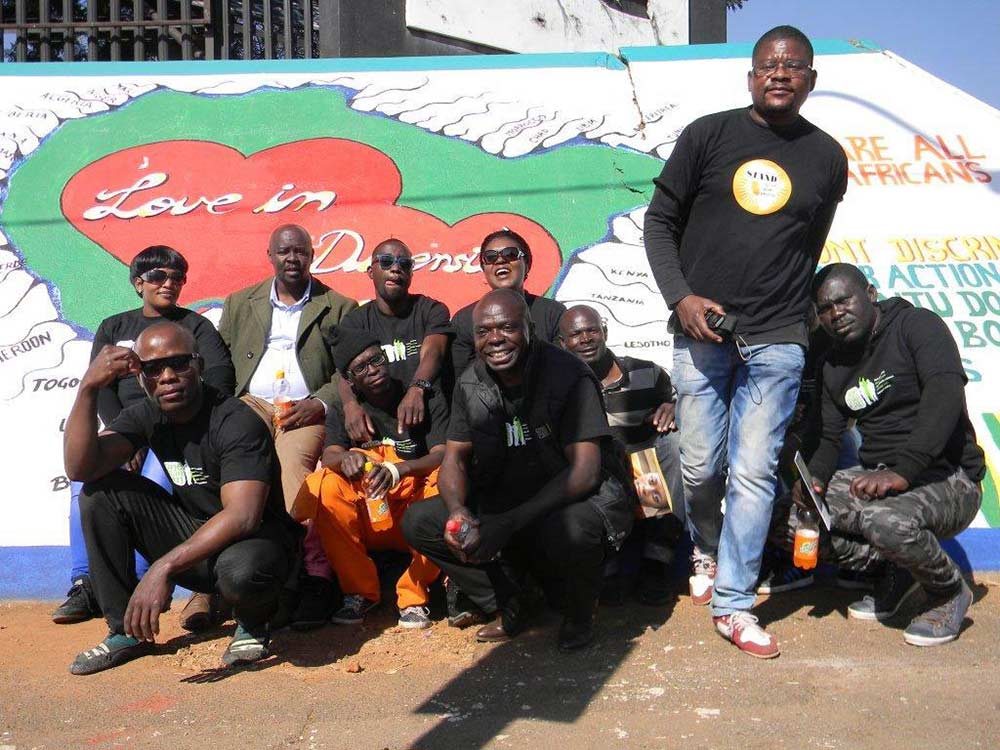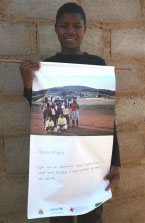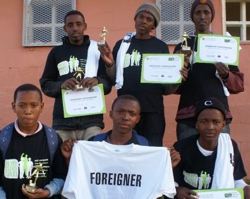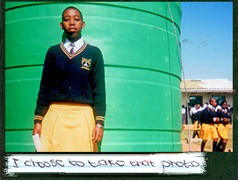On Friday afternoon, the previously unimaginable became frighteningly real. All week an emergency coalition of civil society organisations had met in Cape Town to try and avert the kind of ethnic and xenophobic violence that had killed more than 30 people across Johannesburg the week before. At about 3:00PM in the middle of a meeting with colleagues in Johannesburg, my inbox began to fill with emails titled “Attacks in Strand: Kick in the Emergency Plan”, “Attack in Masiphumelele. Please support”, “XENOPHOBIC ATTACK ABOUT TO HAPPEN IN NY 6 GUGULETHU, CAPE TOWN”, “Shelter for 500 people Rondebosch needed”.
As the plane approached Cape Town, mindful of the appalling necklacing perpetrated against two Mozambican men just five days earlier, I found myself scanning the lights to see whether fires were burning in the townships visible below. The apparent normality in Khayelitsha, Gugulethu, Nyanga, Philipi, Strand, Du Noon and across the Cape Flats belied the mob violence raging below targeting especially Somali shopkeepers but also, as I’d learn the following day, Malawians, Zimbabweans, Congolese and Mozambicans as well as South Africans from outside of the Western Cape.
Early Saturday morning, having been tasked with finding out how many displaced people had gathered at the Cape Town train station, we found that about 1500 people had come to the station to try and catch a train to Johannesburg and from there on to their home countries. Afraid that they’d be vulnerable to attacks at the station, Gary Mars and his colleagues at Metro Rail had housed people in their offices to keep them off the public platforms. In the morning, he’d then organized an additional six carriages to be added. When we walked down the platform, all fourteen carriages were full to capacity, dejected faces looking apprehensive about their safety on the journey ahead through the very same communities in which they had been terrorized.
Back at the Foreshore end of the station about a hundred people, including many very small children, were huddled against their possessions in the far corner of the concourse unable to afford the R140 needed for a ticket and now uncertain about where they would spend the next twenty four hours until the next train. While many people had nothing more than small bags of clothes, some had been able to get some of their bigger household possessions, including a family from Malawi who had been able to bring their fridge, tables and chairs from their shack in Delft.
My colleague Freddy and I talked to two young men from Maputo. Exhausted and reluctant to engage with us at all, they told us they had just arrived from Johannesburg the previous day to escape the violence there and now, disgusted with South Africans, were trying to get on the very next train back to Mozambique. Petros, a young Zimbabwean man who works at the Kennilworth Race Track, told us that he’d been confronted by a group of men armed with “metals, sticks and slashers”. Echoing what we would hear throughout the next 48 hours, he asked “how do I go back to my country? Zimbabwe is ruled by thugs too”. Another group of young men from Zimbabwe said they’d been told they would be killed if they didn’t leave. Printed notes, they said, were being posted on their doors telling them to leave immediately.
Station officials indicated that people would not be able to spend the on the platform and made it clear that they would be moved outside by 10:00PM. Rondebosch United Church, who had received people the night before, indicated that they would again be able to accommodate people and assist with the coordination of overflow.
However, many of the growing number of people on the platform expressed their reluctance to leave the station saying that they needed to be back for the 10:00 AM train the following morning and, in some cases, had incurred significant costs getting their possessions to the station.
Starting at about 7:00, University of Cape Town’s Jammie Shuttle provided transport in 6 buses to about 200 people to a number of churches in Rondebosch including Rondebosch United, Common Ground, and St Paul’s. A small group of people initially indicated that they were going to simply spend the night on the sidewalk outside the station but after receiving assurances that Jammie Shuttles would pick them up and get them back to the station in time for their train, they somewhat reluctantly carried their bags across to the remaining shuttles leaving from the station just before 10:00 in the evening.
On Sunday morning, thanks to help well beyond the scope usually offered by officials, Gary Wells had made sure that the family from Malawi with the fridge, tables and sound system were on the platform eagerly awaiting the arrival of the Shosholoza Meyl to take them out of Cape Town and the country. However, they were few of only a relatively small number of those transported the previous night who were visible back at the station.
Calls to Jammie Shuttle drivers revealed that SAPS had instructed drivers to transport people to Soetwater out near Kommetjie, nearly an hour’s drive from the station. On a follow-up call to Captain Stoffels at SAPS, he insisted that people had only gone to Soetwater if they had requested. Volunteers at the Church, however, reported that it seemed less clear whether people were being offered a choice or not. A briefing at the Human Rights Commission on Monday morning indicated that SAPS had put significant pressure on people to move to far-flung areas.
While both the City and the Province have acted quickly to defuse the violence, some of the decisions made need to be reconsidered. Cape Town mayor Helen Zille indicated on a phone call that she would not open community centres because doing so “would interrupt wedding plans” and she was not willing to do that. By moving people to far-flung areas, the Mayor appears to have prioritized protecting the interests of her middle class constituents and inadvertently colluded with the agenda of xenophobic mobs by moving people to places from which reintegration is made very difficult and from which people can not get to their jobs, schools or vital health services. As of Monday morning she appears to have changed her position and is now appropriately prioritizing reintegration.
Across the city, on occasions we’re now seeing behaviour from officials that reflect the longstanding contempt with which government has all too often treated refugees over many years. We hear reports that the Department of Foreign Affairs officials are sometimes using the crisis to put pressure on people to repatriate. In Johannesburg a child housed at the Cleveland Police Station died over the weekend from Pneumonia. Displaced people in the safety camps in Cape Town face serious health risks including diarrhea, the spread of infectious diseases and the disruption of HIV and TB treatment. In the midst of this, neither the city nor the province has demonstrated that it has a health plan of any sort.
Filling the gap caused by the lack of political leadership, the Treatment Action Campaign, the AIDS Rights Alliance for Southern Africa, Sonke Gender Justice, PASSOP, Habonim, Medicin San Frontier, Shawco and hundreds of volunteers worked flat out over the weekend to collect blankets, food, sanitary supplies, carry out health assessments and ensure the provision of basic services.
These organisations, though, have made it clear that they do not have capacity to continue their efforts much beyond this Tuesday. They are now calling on the UN system and government to act immediately to carry out their mandates to ensure safety and the provision of material support. They are now issuing the following calls:
- The South African Police Services must protect people and their property from xenophobic attacks and accompany people to return to their homes to recover their possessions. Officers not doing their jobs must be held accountable to the full extent of the law.
- UNHCR must come into the camps and shelters to help document so that we know the scale of the crisis, provide the necessary assistance and offer technical advice and assistance to government.
- City and Province must present a health plan within 72 hours to address the infectious disease risks inherent in putting people into congregant settings can spread very easily. Where possible, people should be kept in sites that are in the city and provide easy access to services, jobs and education.
- Where possible, refugees should be kept in the communities in which they were living and linked to health services there. Where this is not possible, camp services should be kept close to health and social facilities.
- Registration should be done only by the United Nations High Commission for Refugees and should include assistance with securing essential documentation destroyed during mob violence.
The urgency of the response, the fear that additional attacks might occur and the horror caused by the events of the last two weeks have kept us focused on urgent responses rather than political analysis. What seems clear though is that years of poor government service delivery combined with a political vacuum created by intra-ANC conflict and longstanding xenophobic practices by government, including raids on churches providing shelter to migrants and refugees, has allowed xenophobic attitudes to metastasize.


 The project put special emphasis on gender equality and the role of men in the children’s lives.
The project put special emphasis on gender equality and the role of men in the children’s lives. The road towards unifying broken hearts and souls that once delivered hatred can only take stairs and not escalator. It is time-consuming challenge that takes a number of days or even years to re-establish love and implement social change. It only requires fresh strategies to reach to the climax, the society that everybody aspires and campaigns for.
The road towards unifying broken hearts and souls that once delivered hatred can only take stairs and not escalator. It is time-consuming challenge that takes a number of days or even years to re-establish love and implement social change. It only requires fresh strategies to reach to the climax, the society that everybody aspires and campaigns for. The PhotoVoice Project is a multi-phased school-based project in which 20 learners from Mphathesitha High School participated in workshops to learn to tell their personal stories using photography. The Project seeks to increase the overall well-being and safety of learner participants through increasing awareness on issues such as gender, HIV and AIDS, and gender-based violence.
The PhotoVoice Project is a multi-phased school-based project in which 20 learners from Mphathesitha High School participated in workshops to learn to tell their personal stories using photography. The Project seeks to increase the overall well-being and safety of learner participants through increasing awareness on issues such as gender, HIV and AIDS, and gender-based violence.